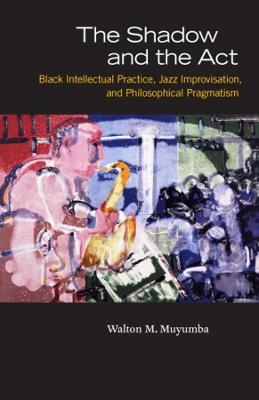
The Shadow and the Act
Black Intellectual Practice, Jazz Improvisation, and Philosophical Pragmatism
Seiten
2009
University of Chicago Press (Verlag)
978-0-226-55424-2 (ISBN)
University of Chicago Press (Verlag)
978-0-226-55424-2 (ISBN)
Though thought of as rivals, Ralph Ellison, James Baldwin, and Amiri Baraka shared a range of interests. Jazz, in particular, was a decisive influence on their thinking. This title connects their writings on jazz to the philosophical tradition of pragmatism, particularly its support for more freedom for individuals and more democratic societies.
Though often thought of as rivals, Ralph Ellison, James Baldwin, and Amiri Baraka shared a range of interests, especially a passion for music. Jazz, in particular, was a decisive influence on their thinking, and, as "The Shadow and the Act" reveals, they drew on their insights into the creative process of improvisation to analyze race and politics in the civil rights era. In this inspired study Walton M. Muyumba situates these thinkers as a jazz trio, demonstrating how Ellison, Baraka, and Baldwin's individual works form a series of calls and responses with each other. Muyumba connects their writings on jazz to the philosophical tradition of pragmatism, particularly its support for more freedom for individuals and more democratic societies. He examines the way they responded to and elaborated on that lineage, showing how they significantly broadened it by addressing the African American experience, especially its aesthetics. Ultimately, Muyumba contends, the trio enacted pragmatist principles by effectively communicating the social and political benefits of African Americans fully entering society, thereby compelling America to move closer to its democratic ideals.
Though often thought of as rivals, Ralph Ellison, James Baldwin, and Amiri Baraka shared a range of interests, especially a passion for music. Jazz, in particular, was a decisive influence on their thinking, and, as "The Shadow and the Act" reveals, they drew on their insights into the creative process of improvisation to analyze race and politics in the civil rights era. In this inspired study Walton M. Muyumba situates these thinkers as a jazz trio, demonstrating how Ellison, Baraka, and Baldwin's individual works form a series of calls and responses with each other. Muyumba connects their writings on jazz to the philosophical tradition of pragmatism, particularly its support for more freedom for individuals and more democratic societies. He examines the way they responded to and elaborated on that lineage, showing how they significantly broadened it by addressing the African American experience, especially its aesthetics. Ultimately, Muyumba contends, the trio enacted pragmatist principles by effectively communicating the social and political benefits of African Americans fully entering society, thereby compelling America to move closer to its democratic ideals.
Walton M. Muyumba is associate professor of English at the University of North Texas.
| Sprache | englisch |
|---|---|
| Maße | 14 x 21 mm |
| Gewicht | 312 g |
| Themenwelt | Kunst / Musik / Theater ► Musik ► Jazz / Blues |
| Sozialwissenschaften ► Ethnologie | |
| Sozialwissenschaften ► Soziologie | |
| ISBN-10 | 0-226-55424-4 / 0226554244 |
| ISBN-13 | 978-0-226-55424-2 / 9780226554242 |
| Zustand | Neuware |
| Haben Sie eine Frage zum Produkt? |
Mehr entdecken
aus dem Bereich
aus dem Bereich
zur politischen Ästhetik des Jazz
Buch | Hardcover (2023)
Phillip Reclam (Verlag)
CHF 49,90
Die Geschichte des Jazz in Deutschland
Buch | Softcover (2021)
Reclam, Philipp (Verlag)
CHF 31,90


